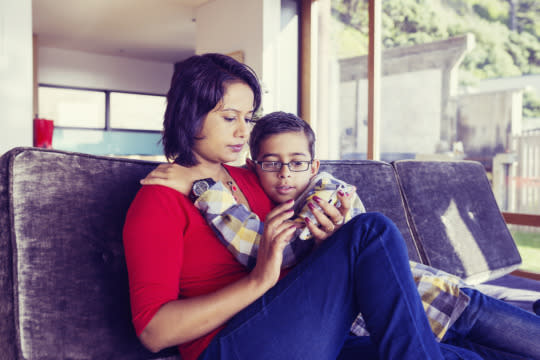When Kids Ask About Mass Shootings, What Can Parents Say?

What do you say to an almost 9-year-old when they ask you why somebody would go into a facility with a gun and kill a bunch of innocent people? What answer do you give when they keep asking “but why?” because they can’t comprehend anything so horrific?
My son and I listen to our local radio station every morning on our drive to school. We know we’re running late if the “River Roadhouse Blues Break” comes on before we hit the main light in town, and we know we’ll get the daily news and weather before we pull into the parking lot.
This past October, there was yet another mass shooting — this time, in Oregon. After they mentioned it on the radio that day, I had to explain what happened to my third-grader. Sure, I could have actually switched off the radio and kept him in the dark about it. But I knew he would hear something about it at school, on the playground or in the hallway. I preferred he heard about it with me so he could ask any questions he could have.
More: Popular comic books send dangerous messages for our kids
And oh, did he have questions.
“Why would somebody take a gun to a school and shoot people? Why would he keep shooting once people were already dead? Why? Why? Why?”
For once, I’m at a loss for words. It would be so easy to say that there was something wrong with this man that made him do it. But as somebody who has recently experienced some severe mental health challenges, I am more so aware than ever about the language I use, and in no way wanted to link this action with being mentally ill or “crazy,” as many like to label it. So I search for another way.
I explain that the killer did a bad thing and that lots of things must have been happening in his life to think that this was OK. It wasn’t the time to get into toxic masculinity and how the shooter was enamored with how much attention previous shooters have gotten. But those follow-up conversations will happen, just as they have happened in the past. We’ll also have some more media literacy conversations the next time he watches a show or perhaps plays a video game with some violent gun action. I can point out that a lot of people see stuff like that on TV and don’t realize how dangerous real guns can be.
More: We’re raising a generation of entitled kids
For now I tell him that he is safe, and when he tells me he doesn’t want to go to college because there seems to be a lot of violence and shootings at them, my heart drops, and I have no idea what to say. I want to tell him he’s wrong. That he’ll never have to worry about something like that, but how can I? We live in a culture that has no problem promoting violence, unhealthy masculinity and that has made it incredibly easy to access guns. In fact, our government seems to be more interested in legislating what happens between my legs than guns. Last time I checked, guns were more lethal than any vagina.
More: America’s gun problem in 7 startling images
I allow some of my anger to seep through as I answer my son. We talk about lax gun laws and how they contribute to events like these. I tell him I write to our representatives to fight for stricter gun laws, and I fight to make it safer so he can go to college or the movies without worrying about something like this.
And then before he rushes off to school, I hug him extra tightly, let him know I love him and that he is a good kid (because as the mother of an anxious kid, I know there’s a whole host of worries that one might not even think of), and then I let him go, because what else can I do?
Unfortunately I know that no matter how much I try to reassure my son, this is not the last time something like this will happen. But I can do my part to teach him about why it happens as best as I can so at least one more young man might not fall down the path that so many before him have. —Avital Norman Nathman
(Photo: Getty Images)
